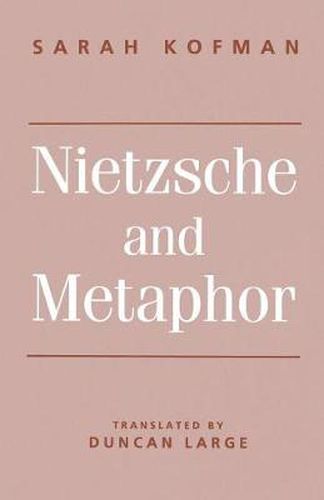Readings Newsletter
Become a Readings Member to make your shopping experience even easier.
Sign in or sign up for free!
You’re not far away from qualifying for FREE standard shipping within Australia
You’ve qualified for FREE standard shipping within Australia
The cart is loading…






This long-overdue translation brings to the English-speaking world the work that set the tone for the post-structuralist reading of Nietzsche. The issue of style, of why Nietzsche wrote as he did, is fundamental, on any level, to reading his texts. Some Nietzsche critics (in particular, those, such as Jean Granier, indebted to Heidegger’s reading), in effect translated Nietzsche’s terms back into those of a philosophy of ontology. This book (which includes an appendix specifically directed against the Heideggerian reading) shows how such an approach fails to interrogate the precise terms, such as Nature or life , that Nietzsche used in place of being, and to ask the meaning of this substitution. The author gives not only a reading of Nietzsche’s ideas, but a method for investigating his style. She shows in great detail how it influences both Nietzsche’s ideas and the way in which they are to be understood. In so doing, she exemplifies how post-structuralist methods can be used to open up classical philosophical texts to new readings. She write conceptually in the knowledge that the concept has no greater value than metaphor and is itself a condensation of metaphors, rather than writing metaphorically as a way of denigrating the concept and proposing metaphor as the norm, and thus acknowledges the specificity of philosophy, its irreducibility to any other form of expression-even when this philosophy has nothing traditional about it any longer, even when it is, like Nietzsche’s an unheard-of and insolent philosophy.
$9.00 standard shipping within Australia
FREE standard shipping within Australia for orders over $100.00
Express & International shipping calculated at checkout
This long-overdue translation brings to the English-speaking world the work that set the tone for the post-structuralist reading of Nietzsche. The issue of style, of why Nietzsche wrote as he did, is fundamental, on any level, to reading his texts. Some Nietzsche critics (in particular, those, such as Jean Granier, indebted to Heidegger’s reading), in effect translated Nietzsche’s terms back into those of a philosophy of ontology. This book (which includes an appendix specifically directed against the Heideggerian reading) shows how such an approach fails to interrogate the precise terms, such as Nature or life , that Nietzsche used in place of being, and to ask the meaning of this substitution. The author gives not only a reading of Nietzsche’s ideas, but a method for investigating his style. She shows in great detail how it influences both Nietzsche’s ideas and the way in which they are to be understood. In so doing, she exemplifies how post-structuralist methods can be used to open up classical philosophical texts to new readings. She write conceptually in the knowledge that the concept has no greater value than metaphor and is itself a condensation of metaphors, rather than writing metaphorically as a way of denigrating the concept and proposing metaphor as the norm, and thus acknowledges the specificity of philosophy, its irreducibility to any other form of expression-even when this philosophy has nothing traditional about it any longer, even when it is, like Nietzsche’s an unheard-of and insolent philosophy.